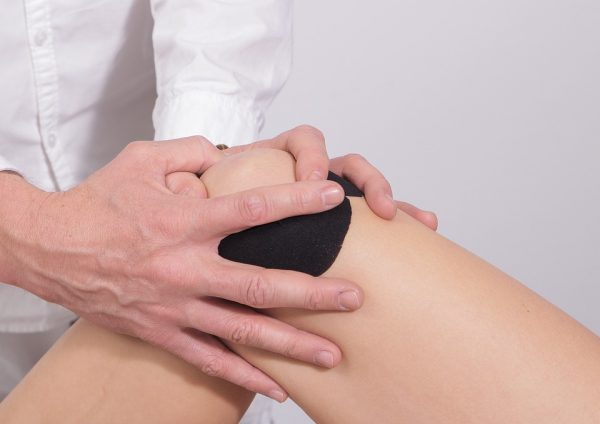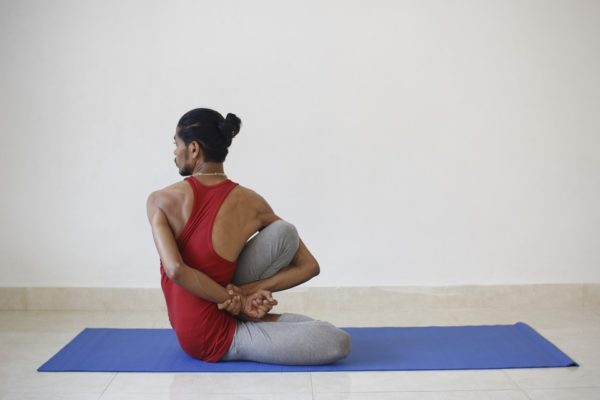What Causes Shoulder Pain at Night?
The shoulder joint, also referred to as the glenohumeral joint, is a ball and socket joint and one of the largest in the body. It is responsible for an enormous range of motion in the upper extremity, enabling movement in all directions. This flexibility, however, can also make the joint vulnerable to injury. There are a number of potential conditions that cause painful and often debilitating symptoms of the shoulder experienced both during the day and at night.

Shoulder pain at night is a common complaint for people with shoulder issues. Many individuals find that their symptoms worsen considerably as soon as they lie down, leading to an uncomfortable and sleepless night regardless of the position they lie in. The inability to sleep because of pain can result in a vicious cycle of daytime fatigue, low mood, brain fog and lack of general exercise and movement due to exhaustion. All of this can worsen painful symptoms and set back recovery time. When this occurs on a regular basis for extended periods of time, it is sometimes referred to as painsomnia.
During the night some patients report that the pain is either stiff or dull as they move from side to side, whereas other patients may experience tingling sensations.
Causes of Shoulder Pain at Night
There are different reasons why shoulder pain at night may manifest, it can be the result of any type of ailment involving the shoulder. However, in cases where pain gets worse at night, it is typically due to one of three conditions: bursitis, tendinopathy, or rotator cuff injuries. Very rarely it can be more serious pathology.
Bursitis
The bursae are fluid-filled sacks that cushion the bones, tendons and muscles near the joints of the body, helping to ease movement by minimising friction. Sometimes, the fluid inside the bursa increases, leading to pain and inflammation, this is known as bursitis. When it occurs in the shoulder, it often results in greater pain at night as when we lie down, the bursae are subject to greater compression leading to increased levels of pain.
Tendinopathy
Tendinopathy is the general term used to describe disorders and degeneration of the tendon. The tendons in our body serve to attach muscle to bone, and as we age, they begin to degrade, become less flexible and more prone to injury. When tendinopathy occurs in the shoulder, the tendons become worn, with potentially some inflammation and can become irritated causing pain and stiffness. Pain is often worse at night when the affected individual is lying down. This may be because the tendons in the shoulder settle into a slightly different position when lying down, decreasing the blood flow to the area, and aggravating painful symptoms. All of this can make it difficult to go to sleep and to stay asleep.
Rotator Cuff Injuries
The rotator cuff is a group of muscles and tendons that surround the shoulder joint, it helps to connect the humerus bone to the shoulder blade. The rotator cuff helps to keep the shoulder stable whilst enabling smooth movement of the joint. Injury, overuse or degeneration, can cause inflammation, swelling and pain. Injury may occur as a result of a direct trauma such as a fall or impact, or it may be from lifting something too heavy. Rotator cuff injuries are typically characterised by pain at the top and the side of the shoulder, the inability to fully move the shoulder, and pain when trying to move the arm. There may be a dull general ache if it is due to wear and tear or degeneration; pain may be severe and appear suddenly if it is the result of an accident. Rotator cuff injuries tend to worsen at night, especially if the affected shoulder is leant on during the night, resulting in a painful and restless night.
Frozen Shoulder
This painful condition also known as adhesive capsulitis, causes severe pain and stiffness in the shoulder. In a frozen shoulder, the shoulder capsule thickens and becomes stiff and tight, adhesions (thick bands of tissue) begin to develop, restricting movement of the joint. Symptoms of frozen shoulder include the following:
- Severe pain in the shoulder
- Pain that radiates from the shoulder into the arm
- Pain that gets in the way of day-to-day activities
- Pain that interrupts sleep at night
- Severely restricted movements of the shoulder
Frozen Shoulder is often categorised into 3 distinct clinical phases. Stage 1 is the acute and painful stage – "the freezing phase", where the shoulder becomes stiff, painful and loses mobility. This can last for several months. Stage 2 is "the frozen phase" where the shoulder is now very stiff, and the range of motion is extremely limited. Stage 3 is "the thawing phase" where mobility gradually starts to return to the shoulder, and ease of movement begins to resolve itself.
Osteoarthritis
Osteoarthritis can affect any of the joints in the body and presents when the cartilage covering the surface of a joint degrades, becoming thinner and rougher. In an attempt to compensate for these changes, the bone underneath the cartilage begins to thicken, becoming broader and resulting in pain, swelling, stiffness and restricted movement. Some people may notice a cracking sound as they move, this is known as crepitus of the shoulder.
If the shoulder joint is affected by osteoarthritis, usually pain and stiffness will be present, with range of motion restricted. Symptoms are often worse during the night and first thing in the morning or after sleeping, as the shoulder is stiff. Throughout the day, the pain may start to ease as the body gently begins to move.
Dislocation and Fracture
Dislocation occurs when the humerus bone pops out of the shoulder socket, and this can happen during an accident or during some sporting activities. Symptoms of a dislocated shoulder include severe pain, both during the day and at night, deformity, swelling, numbness, weakness, and bruising. A dislocated shoulder must be treated as soon as possible. A doctor or other qualified health professional will move the arm bone back into the socket and painful symptoms should begin to improve.
A fracture to one of the bones in the shoulder can also cause severe pain and limited mobility. It is typically the result of direct trauma such as a fall, or direct blow to the shoulder. A fractured shoulder will take several weeks and sometimes months to heal and will require gradual rehabilitation.
Diagnosis of Shoulder Pain at Night
If shoulder pain at night is persistent, interrupts regular sleep and does not improve, then further investigation will be necessary. A doctor or physiotherapist will physically examine the shoulder and assess the medical history to establish if there has been a specific injury or if there are any other underlying health issues. Diagnostic tests such as an MRI, ultrasound scan or X-Ray may be required to help to identify any fractures or structural issues (X-Ray) or soft tissue changes (MRI and ultrasound).
Treatment
Any treatment plan will vary depending on the cause of the shoulder pain. Initially, conservative treatment methods are generally the first port of call with pain relief medication, rest, ice/heat, compression, physiotherapy, and support for the shoulder whilst sleeping.
Medication
Over the counter pain relief medication such as analgesics and anti-inflammatories can be helpful in relieving symptoms. Sometimes stronger, prescription medication may be required – a GP or other qualified practitioner can help to advise on pain medication.
Physiotherapy
Physiotherapy is a highly effective, non-surgical form of treatment that helps to improve flexibility and range of movement by strengthening and stretching soft tissue structures to offer pain relief. Physiotherapy and targeted exercises are also used as part of many rehabilitation programmes alongside other forms of treatment to improve mobility and to reduce painful symptoms.
Corticosteroid Injections
Corticosteroid injections can be used to reduce pain and inflammation caused by several shoulder related conditions such as bursitis or osteoarthritis. This type of injection can provide effective pain relief for several weeks.
Surgery
In some cases, surgery may be necessary to help improve stability of the shoulder joint. Shoulder surgery is either arthroscopic (via a small incision), or open surgery. Following surgery, a recovery programme often includes pain relief medication or injections to ease the pain and inflammation and a targeted physiotherapy plan.
Our Services
Our specialised physiotherapy clinic treats a wide range of conditions and disorders including shoulder issues, to help to improve mobility and flexibility and to reduce pain related symptoms.
We offer detailed assessments for all new patients to determine the underlying cause of the issue and to devise a tailored treatment plan. This often involves specific movements, exercises and stretches, hands on manipulation, shockwave therapy, as well as general advice on what to do and what not to do during recovery, to avoid the pain from worsening or from returning.
As well as our physiotherapy services, we can also offer advice on general well being and address any unhelpful habits such as poor posture, poor workplace ergonomics, poor diet and poor sleeping routines – all of which can contribute to pain-related conditions.
Get in touch to find out how we can help.


